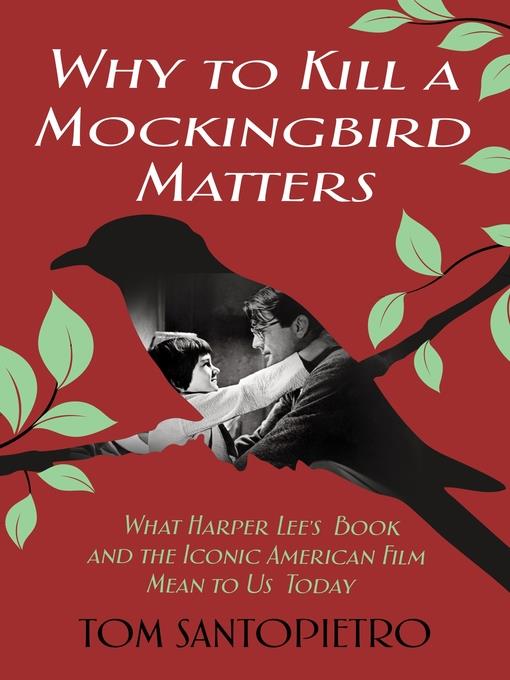
Why to Kill a Mockingbird Matters
What Harper Lee's Book and the Iconic American Film Mean to Us Today
کتاب های مرتبط
- اطلاعات
- نقد و بررسی
- دیدگاه کاربران
نقد و بررسی

April 15, 2018
A detailed account of a classic novel's context, transformation, and acclaim.Translated into 40 languages, with sales of some 40 million copies since its publication in 1960, Harper Lee's To Kill a Mockingbird has become famous worldwide. Adapted on film, it earned its star, Gregory Peck, an Oscar for his portrayal of Atticus Finch, a role that defined him for the rest of his career. In an affectionate homage, media journalist and Broadway show manager Santopietro (The Sound of Music Story: How a Beguiling Young Novice, A Handsome Austrian Captain, and Ten Singing von Trapp Children Inspired the Most Beloved Film of All Time, 2015, etc.) asserts that Lee's novel still sends a relevant message to 21st-century readers. "By wrapping a nostalgic look back at childhood around a clear-eyed gaze at how racism diminishes and damages an entire community," he maintains, Lee offers a way to perceive "America's racial history with a fresh set of eyes." Most of Santopietro's book, though, does not elaborate any more deeply on why Lee's novel matters, or to whom. He covers ground that Joseph Crespino examined in his recently published Atticus Finch: Lee's youth in Alabama; her relationship with her father, a lawyer and model for Atticus; her friendship with Truman Capote; the prolonged writing and revising of the novel, which became an immediate bestseller; and her subsequent writing career, which ended in the long-awaited publication of Go Set a Watchman. To this biographical overview, Santopietro adds a close look at the movie's creation: with Alan Pakula as producer, Robert Mulligan as director, and Horton Foote as screenwriter; and with Gregory Peck (rather than Lee's ardent hope of Spencer Tracy) to play Atticus. The author details casting decisions, especially the search for the perfect girl to play Scout; and the work of designing costumes and constructing sets on the Universal backlot to bring Lee's Alabama town to life. He conveys, as well, critics' reception of the movie and summarizes the major figures' post-Mockingbird careers.For Mockingbird and Harper Lee devotees.
COPYRIGHT(2018) Kirkus Reviews, ALL RIGHTS RESERVED.

April 23, 2018
The cultural impact of Harper Lee’s novel To Kill a Mockingbird, published in 1960, and its film adaptation two years later, is the subject of this clear-eyed appraisal of their enduring relevance. Paying meticulous attention to detail, Santopietro (The Sound of Music Story) crafts a compressed history of the book and film, beginning with Lee’s childhood in Monroeville, Ala., the inspiration for the novel’s town of Maycomb, and ending with the publication of Go Set a Watchman, the novel’s original and vastly different first draft, in 2015. Along the way he dispenses little-known facts culled from interviews and other secondary sources, such as the leading men initially considered to play Atticus Finch—Bing Crosby, Rock Hudson, and Spencer Tracy, among them—before the role landed with Gregory Peck for a career-defining performance. Santopietro shrewdly refers to the novel as “the right book in the right place at the right time” to resonate with a growing civil rights movement, and in later chapters relates its theme to recent racially charged incidents, including the violence that convulsed Charlottesville, Va., in August 2017. Readers not familiar with the stories behind the novel and film will find much to relish. Agent: Malaga Baldi, Baldi Agency.

June 15, 2018
Pop culture writer Santopietro (The Sound of Music Story; The Godfather Effect) has spent several years researching Harper Lee's To Kill A Mockingbird as a novel and as a film adaptation. His argument is that the novel is vital to understanding American culture and that Gregory Peck's portrayal of Atticus Finch in the 1962 film adaptation is equally significant in comprehending the best in human nature. Blending biography with reviews, interviews, and praise as well as criticism, the author asserts that the central themes of both book and movie have not faded with age, that Atticus Finch, with his moral compass, is a hero for all times. VERDICT Fans of To Kill a Mockingbird, the film and the novel, will enjoy this work.--Pam Kingsbury, Univ. of North Alabama, Florence
Copyright 2018 Library Journal, LLC Used with permission.

























دیدگاه کاربران